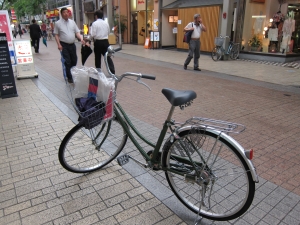In the US, according to a poll conducted by ACTFL (revealingly, no national statistics are kept), just 18.5% of K-12 students are enrolled in a foreign language course. In contrast, nearly all Japanese students study English over several years of their academic career. As a result, English vocabulary is comfortably incorporated into much of day-to-day Japanese. For example, the term for someone who commutes to work by bicycle is 自転車ツーキニスト (jitensha tsuukinisuto), from 自転車(jitensha, bicycle) + 通勤(tsuukin, commute)+ the English-language suffix “-ist”. Even the basic term for the sport of cycling, サイクリング (saikuringu), comes from English.
When I lived in Japan one of the most indispensable items of my daily life was a bicycle similar to that pictured above. In the 1980s, when I first arrived there, bikes like these were not used by adults in the US. As a matter of fact, when I returned to the US and sought out something similar for sale, I couldn’t find anything even close. The one bike shop guy I encountered who actually understood what I was looking for had lived in Asia as well, and he said my only option was to but one in Japan and bring it back with me. Nowadays, at least in the Pacific Northwest, it is not hard to find something like this, as a quick online search through outdoor outfitters such as REI (see example here) will attest.
But returning to Japan and cycling language, bikes like these – which in my experience are owned by nearly every person – are called ママチャリ (mamachari) or, more recently, シティサイクル (shiti saikuru). Mamachari is a rather endearing word, created by the union of ママ (mama, mother) and ちゃりん (charin), the lovely old-fashioned sound of the bells commonly mounted on the handlebars. This name evokes a quiant image of a mother riding along, small child in a seat on back and groceries in the basket in front. A little less lovely on the ears but more up-to-date, shiti saikuru (which sounds to American ears a lot like “shitty cycle”), is made from two English words, “city” and “cycle”.
Though my current housing situation allows me the option of just one bike – and I have chosen this to be a hibrid as the ultimate compromise between speed and function – I hope that someday I can again enjoy the daily pleasure of hopping – in whatever I happen to be wearing – onto my ready-to-go mamachari and heading out to do errands.


Pingback: Japanese cycling jargon ②(サイクリングの専門語②) | Japan's Bicycle Culture (日本での自転車文化)
Pingback: City Cycle “Sharing” Systems | Japan's Bicycle Culture (日本での自転車文化)